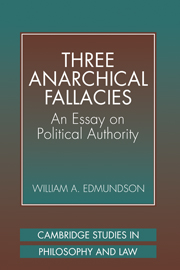Book contents
- Frontmatter
- Contents
- Acknowledgments
- Introduction
- Part One The Fallacious Argument from the Failure of Political Obligation
- 1 Legitimacy and the Duty to Obey
- 2 The Correlativity Thesis
- 3 Legitimate Political Authority
- Part Two The “Law Is Coercive” Fallacy
- Part Three The Inner Sphere of Privacy Fallacy
- Conclusion: The State for What?
- Index
2 - The Correlativity Thesis
from Part One - The Fallacious Argument from the Failure of Political Obligation
Published online by Cambridge University Press: 19 March 2010
- Frontmatter
- Contents
- Acknowledgments
- Introduction
- Part One The Fallacious Argument from the Failure of Political Obligation
- 1 Legitimacy and the Duty to Obey
- 2 The Correlativity Thesis
- 3 Legitimate Political Authority
- Part Two The “Law Is Coercive” Fallacy
- Part Three The Inner Sphere of Privacy Fallacy
- Conclusion: The State for What?
- Index
Summary
A theory of legitimacy has a three-part structure. The first part is a benchmark or criterion of legitimacy, such as a capacity to create political obligation, or an ability to command rational assent, or a moral permission to coerce. The criterion is a central, necessary condition of state legitimacy. The second component of a theory of legitimacy is a substantive moral one that serves to establish what does and does not satisfy the criterion component, for example, a theory of political obligation, to tell us under what conditions, if any, there is a general duty of obedience; or a theory of practical rationality, to tell us under what conditions, if any, reasonable agents would submit to state authority; or a theory of permissions, to establish the conditions, if any, under which state coercion might be morally permissible.
Unlike the first two components, the third is not normative; it describes the social facts that are the necessary background of legitimate authority. When speaking of states, it may be that the criterion is satisfied but an effort to exercise state authority fails to attain legitimacy because too few subjects recognize the authority as legitimate. This can happen where no authority has been established or a more entrenched authority occupies the field. Because our focus here is on the normative aspects of legitimacy, let us assume that there is the degree of de facto or “Weberian” acceptance sufficient to satisfy the third component. Taken together, the three components will state necessary and sufficient conditions of political legitimacy.
Information
- Type
- Chapter
- Information
- Three Anarchical FallaciesAn Essay on Political Authority, pp. 35 - 47Publisher: Cambridge University PressPrint publication year: 1998
